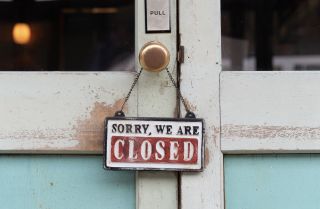Resilience
The Painful Decision to Close a Company
Personal Perspective: How do you know when the right time is to let go?
Posted March 20, 2023 Reviewed by Gary Drevitch

My mental-health treatment consultation and insurance advocacy company, BWellBStrong is three years old. I started it as BWellBStrongBPD and pivoted during the pandemic to include additional diagnoses, such as eating disorders, depression, and anxiety.
Unfortunately, despite my best efforts — and that of a talented mentor — BWellBStrong was unable to gain traction.
I just started a new job as a Clinical Supervisor at a small virtual practice that is taking up a lot of my time. My freelance writing career is flourishing and this fall I will be teaching a course at The College of Westchester.
It was a difficult decision, but I'm letting BWellBStrong go. I'm going to put my efforts into working as a mental-health advocate and influencer.
How do you know when it’s time to close a business? For me, it was both a practical and gut feeling. I was putting money into BWellBStrong every month that wasn’t producing wanted results. Additionally, my accountant informed me that 2022 was the last year I could write off a loss for the business on my taxes.
My gut was telling me to walk away and try to attack stigma from another angle. To continue writing and through my own persona via social media and other avenues. An article in Forbes about knowing when to close a business asks, "If not now, when? How much might you have invested before you finally say no more? It could be the choice between laughing about that $20k past mistake or crying about that $50k nightmare you’re still living. Both might have cost your past but only one is costing your future.”
The word failure has crossed my mind. Data from the U.S. Bureau of Labor Statistics shows that approximately 20% of new businesses fail during the first two years of being open, 45% during the first five years, and 65% during the first 10 years. My mentor, who is an established and successful entrepreneur, had some kind words for me. She said, “First, congratulations on your decision. It takes courage to reassess and pivot. I consider what you are doing as a pivot, not closing shop.”
The Forbes article states, “It’s far more courageous to walk away and find a new path. 'But what will people say?' It doesn’t matter. If a clean break is the move you need to make, let this be the sign that you were waiting for. It’s a greater failure to go down with a ship than take the lifeboat that’s offered.”
I wondered what my mother would think of my decision. She was a successful entrepreneur and I always imagined she was looking down at me, proud of my efforts. I’m unable to think of her as a quitter. I know she’s always loved me unconditionally, but in some way I feel as though I’m letting her down, or at least her legacy. Forbes advises, “If you’re staying put for fear that moving on would be seen as failure, reframe it in your mind and see that situation for what it really is. Closing a business is more about moving on to a new challenge than failing the last.”

That’s the way I have to look at it. I’m moving on to new challenges I’ve established for myself: Writing my memoir. Building my freelance career. Aspiring to become a mental-health influencer. A college instructor.
It’s still hard to acknowledge I’ve tried and made the decision to move on. I’m going to use my DBT skill of Radical Acceptance to accept that this part of my life is over and it’s time to move on.
Thanks for reading.
Andrea


